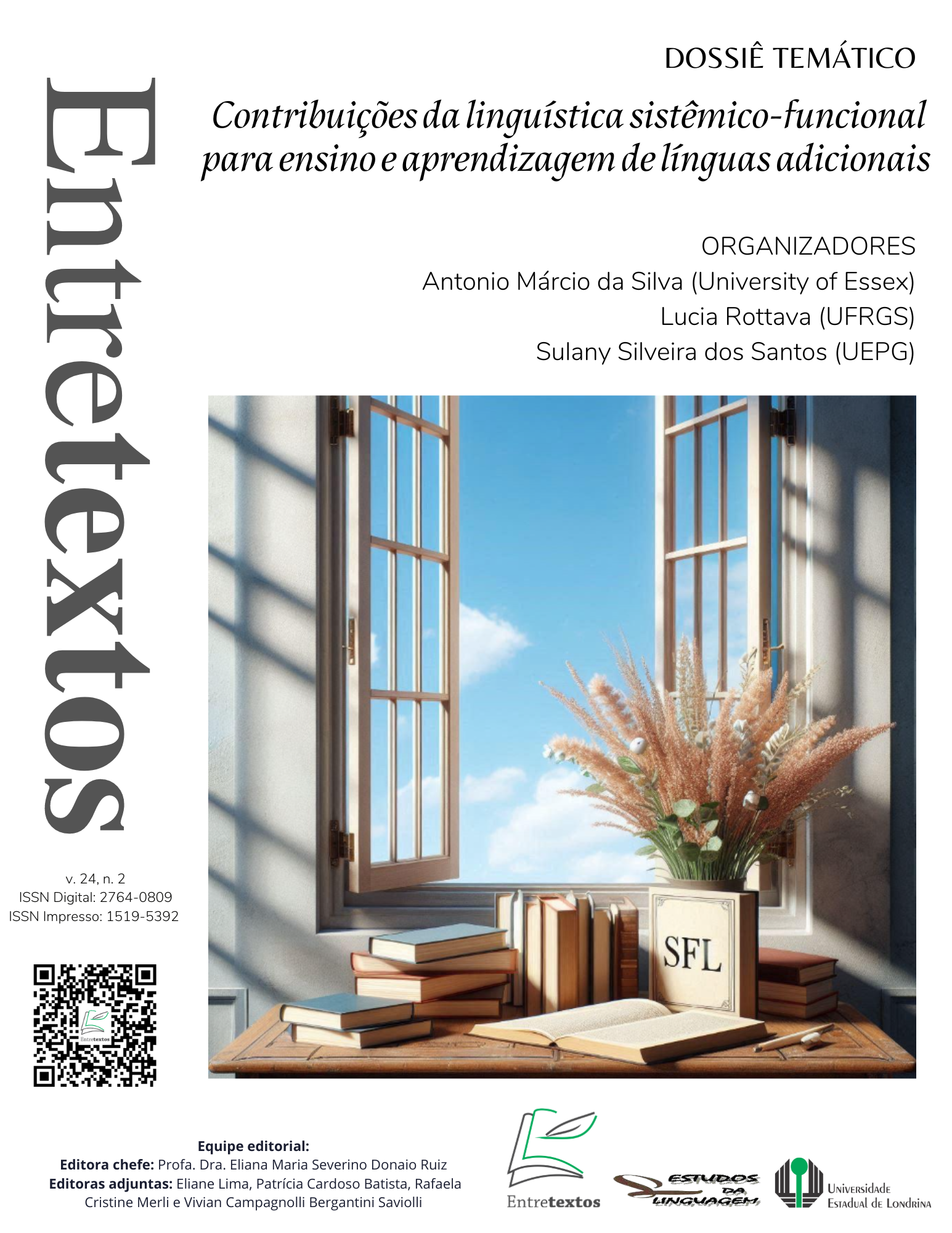El Programa de aprendizaje profesional Leer para Aprender y la pedagogía basada en géneros en la enseñanza y el aprendizaje de idiomas adicionales
Palabras clave:
pedagogía basada en géneros textuales, LSF, géneros en el currículoResumen
En este artículo describimos un procedimiento macro para la secuencia de géneros en el currículo, concebido en la pedagogía basada en géneros del Programa Leer para Aprender. La Lingüística Sistémico-Funcional (LSF), ha sido ampliamente utilizada en el análisis, la educación del lenguaje y, también, la enseñanza y el aprendizaje de otros idiomas. Por lo tanto, presentaremos la aplicabilidad teórico-práctica de los aportes de la LSF y, también, de la sociolingüística de Bernstein (2000), a la enseñanza y el aprendizaje de lenguas adicionales, con el objetivo de que los docentes mejoren la enseñanza de la lectura y la escritura mediante el uso del Ciclo de Enseñanza y Aprendizaje y la enseñanza de géneros (Rose, 2016, 2018, 2020a, 2020b). Desde un punto de vista metodológico, se describen las actividades de enseñanza y aprendizaje, destacando la interacción docente/estudiante a través del Programa Leer para Aprender, de manera que investigadores, formadores de docentes y docentes conozcan los géneros en el currículo, asegurando el metalenguaje pedagógico necessário. Los resultados parecen sugerir que delinear principios para diseñar y enseñar géneros en el currículo puede generar conciencia para la estructuración de los intercambios pedagógicos, rediseñándolos en el aprendizaje a través de la lectura y la escritura.
Citas
ALEXANDER, R. Culture and pedagogy: international comparisons in primary education, Oxford: Blackwell, 2000.
BERNSTEIN, B. Pedagogy, symbolic control and identity: theory, research, critique. Oxford: Rowman and Littlefield, 2000.
CHRISTIE, F. Classroom discourse analysis. London: Continuum, 2002.
DEREWIANKA, B. A new grammar companion for teachers. Marrickville: Primary English Teaching Association, 2011.
FIRTH, J. R. The technique of semantics. Transactions of the philological society, v. 34, n.1, p. 36-73, 1935. DOI: https://doi.org/10.1111/j.1467-968X.1935.tb01254.x
GIBBONS, P. Scaffolding language, scaffolding learning: teaching second language learners in the mainstream classroom. Portsmouth, NH: Heinemann, 2002.
HALLIDAY, M. A. K. An introduction to functional grammar. London: Arnold, 1985 [2nd edition 1994; 3rd edition with C. M. I. M. Matthiessen 2004; 4th edition with C. M. I. M. Matthiessen 2014].
MARTIN, J. R. Exploring content: building knowledge in school discourse. In: LAI, L. T.; MAHBOOB, A.; WANG, P. (eds.). Multiperspective studies of language: theory and practice, Beijing: Foreign Language Teaching and Research Press, 2016, 84-112.
MARTIN, J. R. One of three traditions: genre, functional linguistics and the ‘Sydney School’. In: ARTEMEVA, N.; FREEDMAN, N. A. (eds.). Genre studies around the globe: beyond the three traditions. Bloomington, Ind.: Trafford, 2015, 31–77.
MARTIN, J. R. Metadiscourse: Designing interaction in genre-based literacy programs. In: WHITTAKER, R.; O`DONNELL, M.; MCCABE, A. (eds.). Language and literacy: functional approaches. London: Continuum, 2006b, 95–122.
MARTIN, J. R. La gramática se reúne con el género reflexiones sobre la “escuela de sydney”. Inaugural Lecture Sydney University Arts Association. Sydney: Departamento de Lingüística, Universidad de Sydney, 2000.
MARTIN, J. R.; ROSE, D. Genre relations: mapping culture. London: Equinox, 2008.
MARTIN, J. R.; ROSE, D. Interacting with text: the role of dialogue in learning to read and write. Foreign languages in China, v. 4, n. 5, p. 66–80, 2007a. Disponível em: https://www.researchgate.net/publication/285878102_Interacting_with_text_the_role_of_dialogue_in_learning_to_read_and_write. Acesso em: 07 jun 2024.
MARTIN, J. R.; ROSE, D. Working with discourse: meaning beyond the clause. London: Continuum, 2007b.
MARTIN, J. R.; ROSE, D. Designing literacy pedagogy: scaffolding asymmetries. In: HASAN, R.; MATTHIESSEN, C. M. I. M.; WEBSTER, J. (eds.). Continuing discourse on language. London: Equinox, 2005, 251–280.
MATON, K. Semantic waves: Context, complexity, and academic discourse. In: MARTIN, J.; MATON, K.; DORAN, Y. J. (org.). Accessing academic discourse: systemic functional linguistics and legitimation code theory. London: Routledge, 2020, p. 59-85.
MATON, K. Knowledge and knowers: towards a realist sociology of education. London: Routledge, 2014.
MERCER, N. Words and minds: how we use language to work together. London: Routledge, 2000.
ROSE, D. Building a pedagogic metalanguage I: curriculum genres. In: MARTIN, J.; MATON, K.; DORAN, Y. J. (org.). Studying science: knowledge, language and pedagogy. Chapter 9. London: Taylor & Francis, 2020a.
ROSE, D. Building a pedagogic metalanguage II: Knowledge genres. In: MARTIN, J.; MATON, K.; DORAN, Y. J. (org.). Studying science: knowledge, language and pedagogy. Chapter 10. London: Taylor & Francis, 2020b.
ROSE, D. Languages of schooling: embedding literacy learning with genre-based pedagogy. European journal of applied linguistics, v. 6, n.1, p. 59-89, 2018. DOI: https://doi.org/10.1515/eujal-2017-0008.
ROSE, D. Genre, knowledge and pedagogy in the 'Sydney School'. In: ARTEMEVA, N.; FREEDMAN, A. Genre studies around the globe: beyond the three traditions. Publisher: Ottawa: Inkwell, 2016, p. 299-338. Disponível em: https://www.researchgate.net/publication/355355337_Genre_knowledge_and_pedagogy_in_the_%27Sydney_School%27 Acesso em : 05 nov. 2023.
ROSE, D. New developments in genre-based literacy pedagogy. In: MACARTHUR, C. A.; GRAHAM, S.; FIZGERALD, J. (eds.). Handbook of writing research. 2nd Edition. New York: Guildford, 2015a, 227-242.
ROSE, D. Analysing pedagogic discourse: an approach from genre and register Functional linguistics, v. 1, n. 13, 2014. Disponível em: http://www.functionallinguistics.com/content/1/1/11, http://www.springer.com/-/2/5acb361cd6f34acd9810403ab1890dc3. Acesso em: mar. 2024.
ROSE, D. Sequencing and pacing of the hidden curriculum: how indigenous children are left out of the chain. In: MULLER, J.; MORAIS, A.; DAVIES, B. (eds.). Reading Bernstein, Researching Bernstein. London: Routledge and Falmer, 2004, 91–107.
ROSE, D.; MARTIN, J. R. Learning to write, reading to learn: genre, knowledge and pedagogy in the Sydney School. London: Equinox, 2012.
ROTHERY, J. Making changes: developing an educational linguistics. In: HASAN, R.; WILLIAMS, G. (eds.). Literacy in society. London: Longman, 1996, p. 86–123.
ROTHERY, J. Exploring literacy in school english (write it right resources for literacy and learning). Sydney: Metropolitan East Disadvantaged Schools Program, 1994.
SINCLAIR, J. M.; COULTHARD, R. M. Towards an analysis of discourse: the english used by teachers and pupils. London: Oxford University Press, 1975.
VIEIRA, M. M. C.; VIAN Jr., O. O gênero encontros de serviços como ferramenta para o ensino de língua inglesa. Porto das Letras, v. 9, p. 160-183, 2023.
WELLS, G. Dialogic inquiry: toward a sociocultural practice and theory of education. Cambridge: CUP, 2000.
WILLIAMS, G. Ontogenesis and grammatics: functions of metalanguage in pedagogical discourse. In: WILLIAMS, G; LUKIN, A. (eds.). The development of language: functional perspectives on species and individuals. London: Continuum, 2004.
Descargas
Publicado
Cómo citar
Número
Sección
Licencia
Derechos de autor 2024 Miliane Moreira Cardoso Vieira

Esta obra está bajo una licencia internacional Creative Commons Atribución 4.0.
Entretextos adota a Licença Creative Commons Attribution 4.0 International, portanto, os direitos autorais relativos aos artigos publicados são do(s) autor (es), que cedem à Entretextos o direito de exclusividade de primeira publicação.
Sob essa licença é possível: Compartilhar - copiar e redistribuir o material em qualquer suporte ou formato. Adaptar - remixar, transformar, e criar a partir do material, atribuindo o devido crédito e prover um link para a licença e indicar se mudanças foram feitas.















